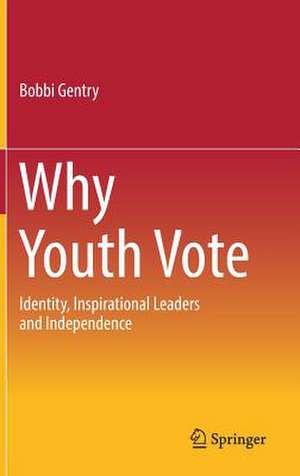Why Youth Vote: Identity, Inspirational Leaders and Independence
Autor Bobbi Gentryen Limba Engleză Hardback – 15 ian 2018
| Toate formatele și edițiile | Preț | Express |
|---|---|---|
| Paperback (1) | 634.32 lei 43-57 zile | |
| Springer International Publishing – 6 iun 2019 | 634.32 lei 43-57 zile | |
| Hardback (1) | 640.37 lei 43-57 zile | |
| Springer International Publishing – 15 ian 2018 | 640.37 lei 43-57 zile |
Preț: 640.37 lei
Preț vechi: 753.39 lei
-15% Nou
Puncte Express: 961
Preț estimativ în valută:
122.55€ • 127.17$ • 102.43£
122.55€ • 127.17$ • 102.43£
Carte tipărită la comandă
Livrare economică 17-31 martie
Preluare comenzi: 021 569.72.76
Specificații
ISBN-13: 9783319696072
ISBN-10: 3319696076
Pagini: 164
Ilustrații: VIII, 164 p. 2 illus. in color.
Dimensiuni: 155 x 235 mm
Greutate: 0.42 kg
Ediția:1st ed. 2018
Editura: Springer International Publishing
Colecția Springer
Locul publicării:Cham, Switzerland
ISBN-10: 3319696076
Pagini: 164
Ilustrații: VIII, 164 p. 2 illus. in color.
Dimensiuni: 155 x 235 mm
Greutate: 0.42 kg
Ediția:1st ed. 2018
Editura: Springer International Publishing
Colecția Springer
Locul publicării:Cham, Switzerland
Cuprins
Chapter 1: Introduction.- Chapter 2: Identity Development in Politics.- Chapter 3: Conceptualizing Identity Development in Politics.- Chapter 4: Inspirational Leaders and their Effects on the Identity of Youth.- Chapter 5: Political Independence and Identity.- Chapter 6: Identity Development and Other Explanations.- Chapter 7: Conclusions.
Notă biografică
Bobbi Gentry is an assistant professor of Political Science at Bridgewater College, a small liberal arts institution in Virginia. She is a youth voting scholar and does extensive research in political identity development. Dr. Gentry has published a chapter entitled “Bridging the Gap between Civic and Political Engagement” in Teaching Civic Engagement, which highlights her theory of political identity development. Her current work on the scholarship of teaching and learning includes best practices in internships, curriculum review in higher education, and identity development in the Political Science classroom.
Textul de pe ultima copertă
This book examines the reasons why young people vote. Viewing political behavior through a psychological lens, this book uses psychological developmental models to test the theory of political identity development and explain how and why young people vote. Rather than studying why young people do not vote, as the majority of the literature does, the book discusses the mechanisms and purpose behind youth voting. Themes of the text include identifying how political identities develop in young people, how leaders can contribute to identity development, and how we can explain differences between young Independents who will vote and those who will not. The first chapter engages the reader with the background for each theoretical element of the book and develops the argument for the book as a whole. Three major substantive chapters discuss and test the theories of political identity development, political leadership as identity role models, and how we misunderstand political independence bynot taking into account why young people might choose to identify as an Independent. The final chapter discusses implications for upcoming elections and how this research might better inform people and institutions interested in increasing youth turnout to reformulate their approach. An overarching discussion of identity and the political components of identity development, this book will be of interest to political scientists studying public opinion and voting behavior, campaigns and elections, and political psychology, as well as practitioners such as civic engagement and youth voting groups who wish to engage young people in the political process.
Caracteristici
Analyzes youth participation in elections through the lens of political identity Highlights the role of leaders in aiding young people in their search for political identity Discusses why youth vote, rather than why they do not, in contrast to the majority of extant literature
